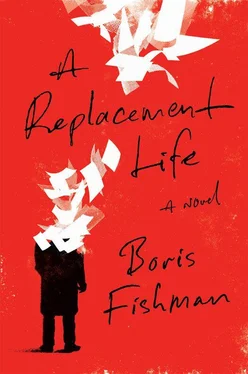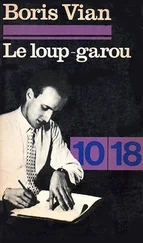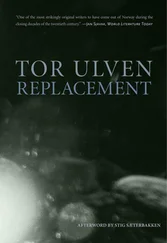Slava laughed. “So you are going to commit your own fraud to prevent the original fraud?”
“Fraud?” Otto sprang back. “Who said the original issue is fraud?”
Slava’s face fell. “I thought you said…” He felt his face color.
“Ha!” Otto broke into laughter and slapped the bar with his hand. “I got you! I am pulling your leg, ha-ha!” He buried his face in the crook of his arm. “I’m sorry, Mr. Gelman,” he said, emerging. “I am truly unprofessional. This investigation business is overexciting sometimes. No, you are right — it is a smaller sin for the sake of a big justice, that’s right.”
“Why can’t you just pay them?” Slava said. “Just pay them all. So what if they’re false? What if a thousand of them are false? What if you pay every — all the people who want expanded eligibility now, the soldiers, the evacuees. What if you pay every one of them? It wouldn’t break Germany, and it still wouldn’t be enough. It will never be enough.”
Otto looked at him chidingly, as if at a petulant child. “Mr. Gelman, do you know who my father was? He was a soldier in the Wehrmacht. And my mother was a nurse for the wounded soldiers. But that is not why I am sitting here. I do not believe in the sin of collection. The war was over six years when I was born. I will not deny anything about my father — not what he did during the war but also not that he was a wonderful father. But those Red Army soldiers did not rape woman after woman in Berlin?” He held up his hand. “Mr. Gelman, we can go on and on like this. This is why there is a law. If I was born six years after the war, you were not even a shine in the eyes of your parents. Even your parents did not exist yet. The suffering of your grandparents belongs to you not any more than I belong to the crimes of my father.” He held up both hands. “I know what you say next in this dictation: ‘My parents almost did not exist because of people like your father.’ I know. The dictation is well practiced. Let us go beyond the dictation. Let’s take this down from the sky. I understand there cannot be justice. So all there can be, then, is the law. This is about people who deserve help. Let’s help them.”
“But what is it that you want from me?” Slava said.
“I want to understand what makes someone do this, Mr. Gelman. You have just argued to me on the moral ground. They all deserve it and then in addition. All right. Is this the deciding factor, or are there others?”
“Why not?” Slava said.
“Well,” Otto held up his hands. “I don’t know. It is somehow too handsome. Too easy. The moral defender.”
“You are not a moral defender?” Slava said.
“Akh,” Otto waved his hand. “What kind of a defender am I? Paper-pushing. I am making sure there are no interruptions, that all papers go where they need to. Yes, it is my small contribution, but morality is a big word. A word from a capital letter. I am not a moral defender.”
“The letters — it’s the same thing,” Slava said. “A smaller sin for a big justice.”
“I don’t know,” Otto said. “Perhaps. You know, the motive doesn’t matter, only finding the false ones. The motive I am simply curious about. I began to look into this, and— Well, it is more interesting than ‘put this paper here, put this paper there.’ I started to think.”
“How did you find out?” Slava said, tiptoeing.
“Someone called the Conference.”
“Who?” Slava said indifferently.
“You know I cannot say. They said: ‘Letters are being forged.’ Which letters they did not say. ‘Who is forging?’ This part they did not say also. ‘Why are you calling?’ ‘Because to do justice.’ This part I do not believe. More like they are getting back at someone for something. But does that mean what they are saying is a lie? I don’t know. What do you think?”
Slava shrugged. “I don’t know,” he said cautiously. “I need to know more.” He straightened and went for it: “Besides, why me? I’m sure there are people who study this.”
“And you can reach them in one minute!” Otto exclaimed. “In Germany, to speak to such an individual, I would have to file a request with the academic dean, wait one week, then another form. Here? The gentleman’s direct number was on his Web page. ‘Andrew Morton, speaking.’ Can you imagine?”
Slava’s heart stopped. Otto eyed him like a wolf, the cheekbones ravenous.
“And what did he — he explained—” Slava stumbled, his skin burning.
“So it is my lucky day, I guess,” Otto said. “Because this gentleman says he has just received a phone call on the very same subject from a writer for Century magazine, named — named — one second”—Otto rummaged frantically in his pockets, pulling out a crumpled Post-it—“Peter Devitsky.”
“Devicki,” Slava corrected, his face a wreck.
“Your colleague at Century ,” Otto affirmed.
“He’s not a writer,” Slava said.
“But he is a writer, Mr. Gelman,” Otto said. “I searched for him on the Internet, and I found several articles. Short articles, but with him as the author.”
“You think he had something to do with it?” Slava said, trying to hold his voice steady.
“No,” Otto said, shaking his head resolutely.
Slava wasn’t ready to have Devicki indicted for fraud, but he was disappointed by how quickly Otto gave up the possibility.
“Let’s think about this together,” Otto said. “Devicki is a Polish name. Why would he be forging letters for Russians? They can’t even speak to each other.”
“The languages are similar,” Slava said feebly.
“Something tells me you are not Mr. Devicki’s first friend,” Otto giggled, surveying Slava’s collapsed expression. “No, Mr. Gelman, it is also something else. One look at Mr. Devicki’s articles online, and it is immediately obvious — it’s not him. He is not that kind of storyteller.”
“Why not?” Slava whined.
“Why not.” Otto looked at Slava with rebuke. “I’ll show you why not.” He unclasped the gold buckle of his briefcase and withdrew a manila folder. From it, he began to extract letters that Slava had written. Otto had marked certain words and sentences with fat red circles and asterisks. He called out the names as he slapped the applications on the warped wood of the bar: “Shlomberg! Feinberg! Shpungin! Abramson!” Raising his eyes at Slava: “Gelman.
“Sometimes there is this maneuver,” Otto said. “Really, I take my hat off to the author. My hat is practically on the floor about this. The sentence begins with a formal expression, and then, boom! Suddenly, it is something very— I don’t know the word. Umgangssprachlich. I love this maneuver. It makes the sentence sound so… It makes you forget you are reading a story.”
Slava was speechless, stooped in his chair.
“Colloquial, I think,” Otto said. “ Umgangssprachlich is ‘colloquial.’ In any case, it is not Mr. Devicki’s style.”
“Then whose style is it?” Slava said, his mouth dry.
Otto’s eyes shone with amusement. “Whose style is it?” he repeated. “Ha! You are a joker, Mr. Gelman. Why, it is your style!”
Slava collected every last bit of deceit inside him and managed to laugh in Otto Barber’s face. “They couldn’t pay me to do this,” he said.
“It was very clever, Mr. Gelman, to say Peter Devicki,” Otto went on. “It took me some time to understand it was not Peter, that was a distraction. And then to get the flowchart for the departments at Century , and then who is on Junior Staff, and study the profiles. That young man Avi Liss — I think he is not the most suspicious person in the world.” Otto’s eyes lit up. “Do you know how I did it, Mr. Gelman? I called the magazine and I said, ‘I am from the Media Blue Book Directory.’ I learned this from the letters, Mr. Gelman; you must include one specific detail, like the color. Would you have believed my story about the tea if I had not said yellow shoes? Anyway, I said I needed the flowchart for our annual issue. I don’t know why they sent me to this Layout person — what is layout? — but could he please just save my day and fax me the flowchart? I mean, it was really too easy.” Otto shook his head again, as if remembering a great wartime exploit. He turned to Slava, knocking him with a knee in excitement. “You know what, Mr. Gelman? It was addictive! It was a high. You put down the phone and you say, ‘I want more!’ I want to look someone in the eye and state a complete lie and have that person nod with great feeling because he thinks I have just told him the truth. What a power! It is God’s power, Mr. Gelman. It is sublime. It is dangerous! The author of these letters, Mr. Gelman? I became him for the length of one phone call!” He leaned toward Slava in conspiracy. “Also, I believe Andrew Morton is sleeping with his assistant.”
Читать дальше











